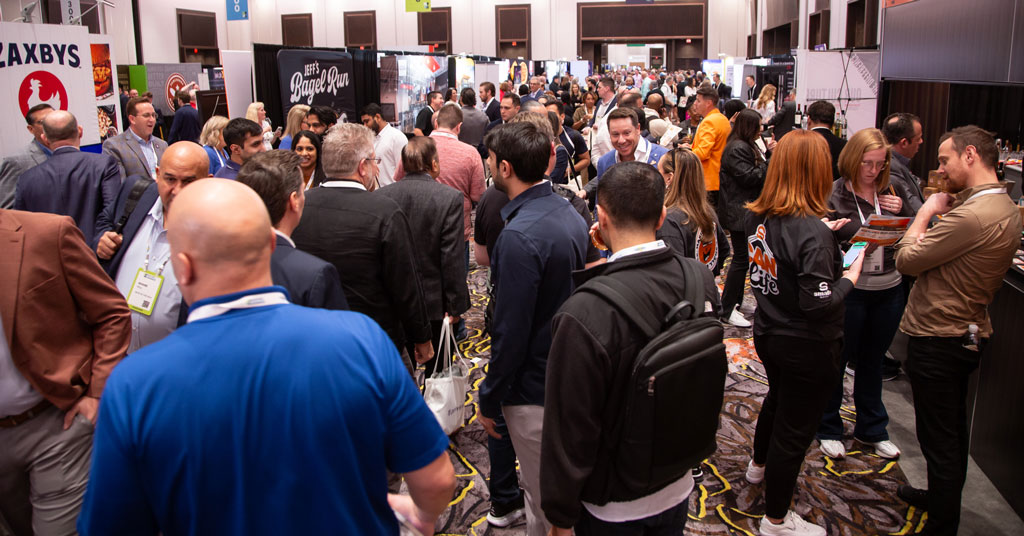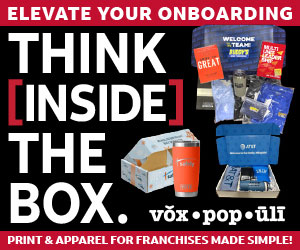MUFC Advisory Board Looks Ahead to 2025

What are you thinking about 2025? In this special year-end edition, we asked the Multi-Unit Franchising Conference (MUFC) Advisory Board—experienced and successful franchisees all—what they’re thinking about what the year ahead holds for franchising. Franchisees attending the conference will have the opportunity to meet several board members (and each other!) face-to-face at the Franchisee-Only Welcome Mixer. See you there?
Franchisee Bytes: What are the best sources for capital expansion?
Like what you see? Subscribe here.
DAVID OSTROWE
David Ostrowe, Incoming Chair of Franchise Update’s 2025 Multi-Unit Franchising Conference, is the founder & CEO of O&M Restaurant Group, currently a Taco Bell franchisee. In addition to his successful franchise operations and related businesses, he’s served as Oklahoma’s Secretary of Digital Transformation and Administration, and was Chairman of the Board of Trustees for Oklahoma’s Lottery Commission.
Looking ahead to 2025, we can expect significant discussions in Congress around critical issues like taxes and immigration. Whether you’re a Democrat or Republican, several expected legislative changes could work in our favor. Removing taxes on overtime pay and tips, for instance, would mean immediate raises for employees, motivating them to invest further in their work. Accelerated depreciation and reduced corporate tax rates could free up capital for franchisees, allowing for faster development and the ability to attract top talent. Legal immigration pathways could open doors for staffing, helping us resolve ongoing workforce shortages. More cash in consumer hands hopefully leads toward higher transactions.
GRANT SIMON
Grant Simon, a serial entrepreneur with more than 30 years of business management experience in the retail, food, and service sectors, is co-founder and CEO of LSGF Management where he oversees multiple Smoothie King, Great Clips, and T-Mobile locations.
With an incoming business-friendly administration having clinched full control of Congress, and federal interest rate cuts expected to continue, the prospect of a growth economy is excellent. By late 2025, multiple factors will drive growth, including regulatory reforms, lower taxes, and greater availability of attractively priced debt capital. 2025 also should be the year that businesses realize significant productivity gains through more widespread AI applications, spurring both the economy and profitability.
High wages will continue to increase and create headwinds for franchisees in 2025. Strategic payroll management, including scheduling optimization, staff retention, and productivity tools may generate cost efficiencies and increase profitability. As construction costs and rents will most likely remain high, accurate and adequate budgeting is vital for growth.
AZIZ HASHIM
Aziz Hashim is managing partner of NRD Capital, whose portfolio includes known brands Ruby Tuesday and Frisch’s Big Boy, as well as fast-growing brands Fuzzy’s Taco Shop and The Captain’s Boil. In 1996, he founded NRD Holdings, which grew into one of the largest restaurant franchisee companies in the U.S. Its brands included Popeyes, KFC, Taco Bell, and Domino’s. In 2014, he founded franchise-focused PE firm NRD Capital and served as Chair of the Multi-Unit Franchising Conference. In 2016–2017, he served as Chair of the IFA. His current initiative is called SocialBites.
Credit costs, while declining, are still high for retail brands as financial institutions still consider the retail sector to be high risk following a spate of closures. This will tamp down new development for the immediate future.
Non-performing units will be a drag on a multi-unit franchisee’s portfolio and drain valuable resources away from the performing units. Underperforming units tend to take disproportionate time and energy to manage and are bad for team morale. Development agreements are unlikely to be met on schedule owing to a lack of financing, and while the retail economy remains weak.
Units within a franchisee’s portfolio must be examined carefully. We have always recommended an ongoing “pruning of the tree.” While no operator likes to close units, the reality is that underperforming units must be eliminated for the overall health of the tree. Negative cash flow units represent a drag on a franchisee’s finances, take precious time and resources from stronger units, and can potentially even create consumer risks, particularly in the restaurant and other perishable goods spaces.
Labor remains challenging, now more because of cost than availability. Some areas already are at $20/hour at a time when consumers want more discounts on products. Automation and AI will eventually kick in, slowly, and are unlikely to materially affect 2025 conditions. Labor conditions must be monitored vigilantly. In areas where labor is increasingly challenged, development should be redirected to areas where labor is more plentiful.
JOHN HOTCHKISS
John Hotchkiss operates multiple Little Caesars Pizza and Firehouse Subs location. He also is involved in real estate development in Texas and Louisiana.
I don’t see any major economic changes for 2025. Inflation and interest rates will probably stay close to today’s rates. I think our sales will continue to increase as they have over the past 5 years. Franchises in 2025 will probably have similar results to 2024. Trump’s economic policies will probably not affect much until 2026 when I think things will begin to change, resulting in winners and losers depending on their specific business model and location.
I think Trump’s eventual deregulation will have a big positive effect for the franchise community as it relates to financial, tax, and labor regulations. However, I do not see how more tariffs will help anyone, including business owners, but they could really damage everyone’s financial situation as it relates to much higher prices for everyone. If Trump gets his way and deports 10–20 million immigrants from our country, then we will lose that many customers in our economy—specifically in Texas where we operate. Mass deportation also will add to the ongoing labor shortages and inflation, including in food and labor cost.
TOYA EVANS
Toya Evans, the 2022 Spirit of Franchising MVP (Most Valuable Performer), was selected for her extraordinary and enduring performance, growth, and community giving. She was profiled in the Q3 issue of Multi-Unit Franchisee magazine. Her portfolio includes Tropical Smoothie Cafe, Hand & Stone Massage and Facial Spas, and V/O Med Spa.
With a new administration that is business-friendly, I expect we will see a reduction in interest rates and banks more receptive to lending for expansion. I also expect that joint employer discussions will taper. This and other potential incentives support our business expansion goals.
ROB BRANCA
Rob Branca is the elected leader in the Dunkin’ Donuts Brand Advisory Council, Chair of Northeast US Region, Member of the IFA Board of Directors, Chair of Inspire Brands' Government Affairs Committee, IFA Franchisee of the Year, and Past Chair of the Multi-Unit Franchising Conference. He and his direct family partners own and operate more than 200 Dunkin’ locations.
The massive spending bills passed during the Biden administration (Chips and Science Act and Inflation Reduction Act) have deployed both public and private capital and are just now about to take root. Absent any “black swan” or other unforeseeable events, this should stimulate even more domestic economic activity and create opportunity for those positioned to capitalize on it.
Other economic forces already entrenched that have boosted the fortunes of those with investable assets in this bifurcated economy will continue to deliver returns and more investable capital to exploit the new opportunities. I see an economic flywheel coming that could greatly expand our economy further, provided that excesses in past expansions are not repeated.
Multi-unit operators should pay very close attention to the upcoming, nearly certain, tax legislation. Several aspects of it directly and substantially affect a typical multi-unit franchise owner. Of particular note has been the loss of accelerated depreciation because the Tax Cuts and Jobs Act was passed through reconciliation. (The reconciliation process requires legal provisions to pay for any tax deductions. We happened to be the “pay for” in that last round in 2017.) Any franchise owner with a brick-and-mortar store has a remodel obligation, and the costs of remodels have skyrocketed in recent years. This is a major impact on a franchised business’ cash flow.
There are other key considerations, and I urge all franchise owners to attend the IFA’s fly-in to Washington, D.C. in September to advocate for their own interests. No one can do it better than you yourself can.
FRANCHISEE BYTES
What are the best sources for capital expansion?
I rely on Western Franchise Financing, a bank-owned, direct lender based in North Dakota. They specialize in franchise financing, making them an ideal partner. Typically, I finance 50% of buildout costs through WFF and use cash flow for the remainder. Their expertise and flexibility have been crucial to our expansion.
—Jacob Webb, Franchise Owner, MPUT Holdings LLC, 22 Marco’s Pizza, 4 Tropical Smoothie Cafe
It has changed over the years. When we first started, we would use SBA loans. We also were very creative, working with municipalities and different grants. Later on, we made it onto the radar of GE Capital as our first institutional lender, and that has worked very well.
—Irfaan Lalani, CEO/Co-Founder, Vibe Restaurants, 76 Little Caesars, 60 Wingstop, 3 Whataburger
Instead of taking a large profit in the early days of our business, we reinvested our earnings back into the business. That way, we limited our debt.
—Jerome Johnson, Multi-Unit Franchisee, John Cove Management and Jbar Inc., 10 Dunkin’, 4 Sonic Drive-In, 4 Baskin-Robbins, 1 Jersey Mike’s Subs
We have not used our real estate as leverage and instead have used old-fashioned cash flow. We want to ensure that we never have another 2009 and can be ready for the opportunities when they arise.
—James Brajdic, President, Customer Maniacs & Green Bay A Dub, 13 A&W
We’ve used local banks, which are particularly good for the real estate side of my business. I’m increasingly intrigued by crowdsourcing capital for expansion. Having local investors pool money and own a piece of a beloved brand could yield positive outcomes. I’m actively exploring partnerships with experienced franchisees in different sectors.
—Bryce Bares, Franchise Owner, QSR Services LLC, 30 Dunkin’, 1 Baskin-Robbins
Unlike many of our peers, we utilized fixed-rate, aggressively amortizing debt, most of which originated in 2021. This approach has significantly deleveraged our business, allowing for aggressive investment.
—Mike James, Founder, Managing Partner, Guernsey Holdings, 122 Sonic Drive-In, 20 Zaxby’s, 3 Take 5 Oil Changes, and a 53-unit development agreement with 7 Brew Drive-thru Coffee
Share this Feature
Recommended Reading:
| ADVERTISE | SPONSORED CONTENT |
FRANCHISE TOPICS
- Multi-Unit Franchising
- Get Started in Franchising
- Franchise Growth
- Franchise Operations
- Open New Units
- Franchise Leadership
- Franchise Marketing
- Technology
- Franchise Law
- Franchise Awards
- Franchise Rankings
- Franchise Trends
- Franchise Development
- Featured Franchise Stories
| ADVERTISE | SPONSORED CONTENT |

$200,000
$50,000





 The multi-unit franchise opportunities listed above are not related to or endorsed by Multi-Unit Franchisee or Franchise Update Media Group. We are not engaged in, supporting, or endorsing any specific franchise, business opportunity, company or individual. No statement in this site is to be construed as a recommendation. We encourage prospective franchise buyers to perform extensive due diligence when considering a franchise opportunity.
The multi-unit franchise opportunities listed above are not related to or endorsed by Multi-Unit Franchisee or Franchise Update Media Group. We are not engaged in, supporting, or endorsing any specific franchise, business opportunity, company or individual. No statement in this site is to be construed as a recommendation. We encourage prospective franchise buyers to perform extensive due diligence when considering a franchise opportunity.